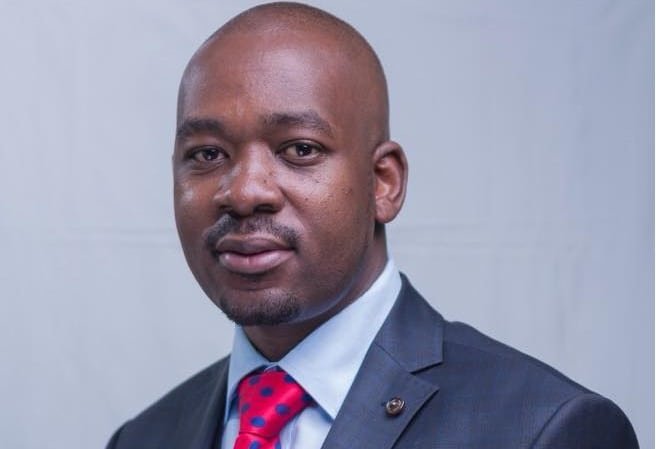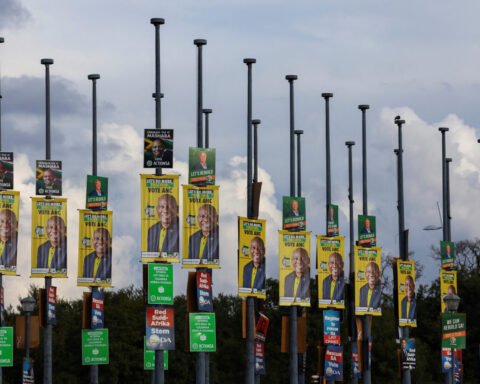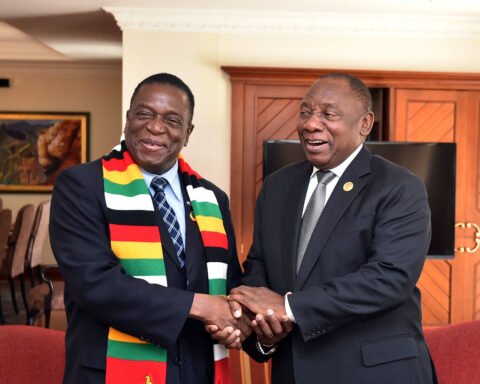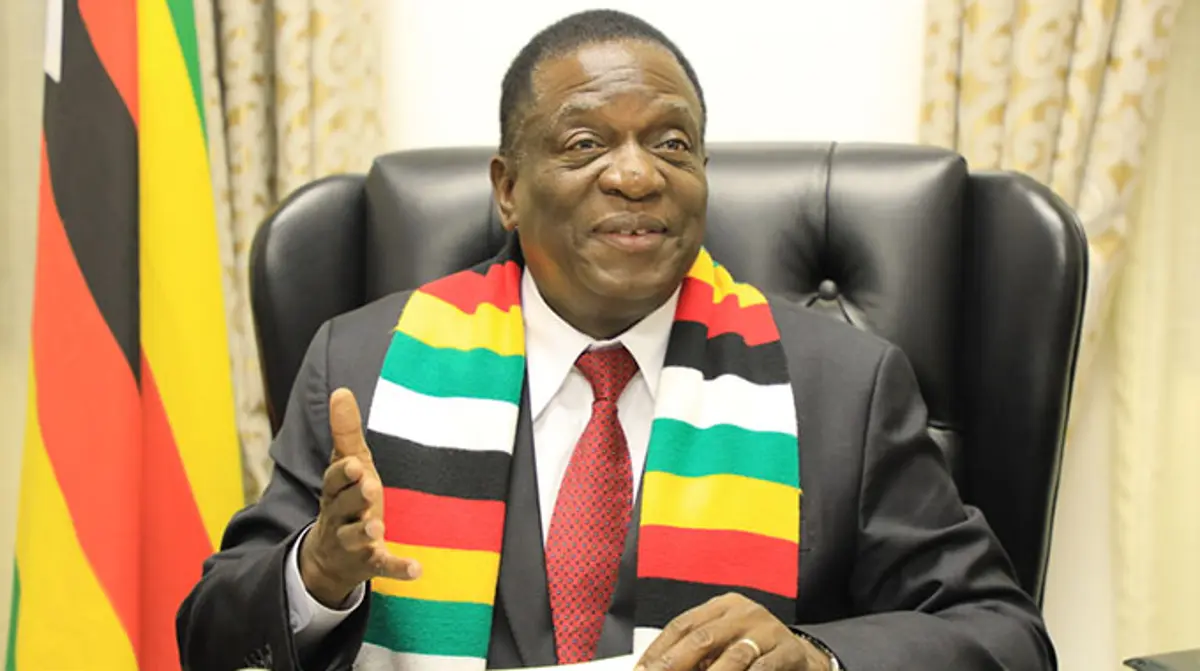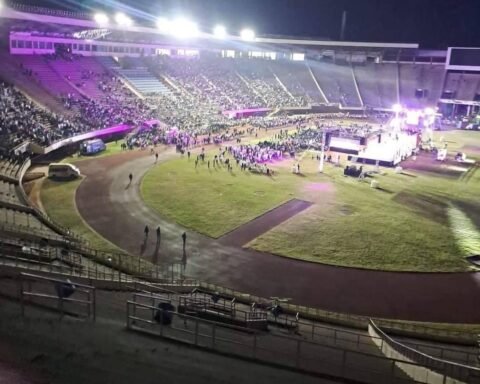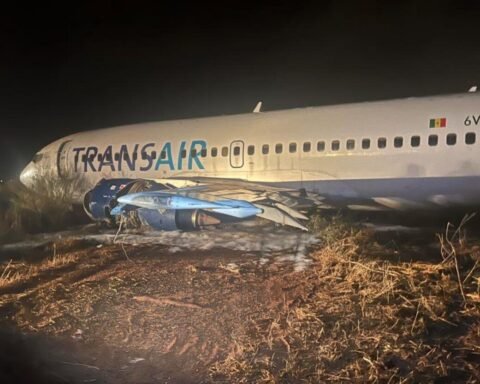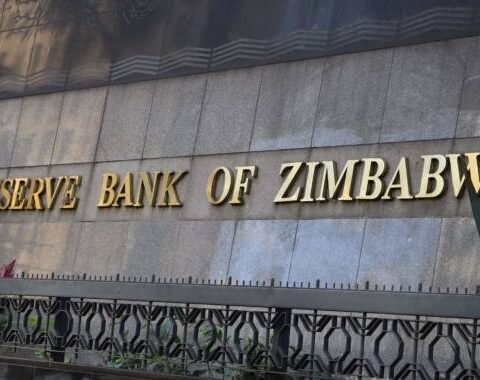“His ability to connect with the aspirations of people in Zimbabwe has made him draw crowds,” MDC-T national youth league secretary-general Lovemore Chinoputsa says of his party leader Nelson Chamisa.
“He is making us as a people re-imagine a better and prosperous Zimbabwe and is making us as young people dream big.”
Chinoputsa says after years of “stagnant and boring politics”, Chamisa has risen to the occasion by “offering a simple and smart message that we can do it as Zimbabweans”.
On Monday, Zimbabweans will choose between Chamisa and Zanu-PF’s Emmerson Mnangagwa in the country’s first presidential election of the post Mugabe era.
Mnangagwa took power in a bloodless military coup in November. Chamisa rose to prominence after the death of veteran MDC leader and trade unionist Morgan Tsvangirai on Valentine’s Day this year.
Political commentator and analyst Blessing Vava says the huge turnouts at the rallies are a result of Chamisa’s “charisma”, “oratory skills”, youth and the fact that he is leading the main opposition Movement for Democratic Change-Tsvangirai (MDC-T).
In fact, Chamisa has been involved in politics for half his life, having served as the secretary general of the Zimbabwe National Students’ Union between 1999 and 2001.
He was born at Silveira Mission Hospital in Bikita, Masvingo province, on February 2, 1978, to Alice and Sylvanus Chamisa.
Having enrolled at Harare Polytechnic College in 1998 for a National Diploma in Marketing Management, his eloquence saw him elected as Harare Polytechnic College Students’ Representative Council president in the same year, only to be expelled the following year after leading several campus protests.
By the time he was 20, he was an active member of the Christian Union, Marketing Students’ Association and the International Socialist Organisation.
Chamisa holds a BBA Marketing Degree IMM (South Africa), BSc Honors Political Science (University of Zimbabwe), Masters in International Relations and Diplomacy (University of Zimbabwe), Governance and Development Studies, (Stanford University in California, USA). BLL Law (University of Zimbabwe) and a Degree in Theology from Living Waters Bible College (Zimbabwe).
The MDC Alliance presidential candidate went to Vumba Primary in Gutu between 1984 and 1990, before going to Alite Mission Reform High and Victoria High schools. He married Sithokozile on April 10, 2010, and the couple have a son, Ashley
In his yet-to-be-published book, Who is Who? Zinasu Leaders 1997-2008, Vava writes that Chamisa’s greatest inspiration were the students of Yugoslavia, who overthrew their country’s dictator, Slobodan Milosevic.
“As he [Chamisa] puts it, the quest for justice, academic freedom and the need for yearning for freedom made him join student politics. One of the incidents he clearly remembers was when he resisted a move by the then college principal, Chivanda, to ban hostel visits after the stipulated time,” Vava writes.
“Together with other SRC members, namely secretary-general Godfrey Koster, Innocent Mupara, Darlington Madzonga and Philip Pasirayi, they organised a number of demonstrations against Chivanda’s authoritarian administration and privatisation.
“It was when he was at Harare Poly that Chamisa recruited and oriented a group of vibrant and conscious cadres that assumed the name Polymulenge. It’s main role mainly was to mobilise students for demonstrations.”
Vava recalled that the Harare Poly graduation ceremony of 1998 marked a key moment in Chamisa’s political career. As the union president, he had been barred from speaking at the event but proceeded to do so, to dramatic effect.
Chamisa forcibly grabbed the microphone from the guest of honour, then higher education minister, Dr Ignatius Chombo, and addressed the gathering in the full glare of CIOs (Central Intelligence Organisation operatives) and police officers at the event. Graduates started whistling and singing revolutionary songs.
As this happened, six riot police officers grabbed and arrested the student leader before bundling him into a police Santana vehicle. Before the police could drive off, scores of the graduating students left their seats, surrounded the vehicle. They threatened to set it alight and demanded the police let Chamisa go.
A few minutes later, the police released him. This was followed by violent clashes between the students and the police.
The violent clashes resulted in Chamisa being expelled, which he challenged successfully in the high court. He was represented pro bono by Tawanda Hondora and his current MDC Alliance partner Tendai Biti.
Chamisa has survived two attempts on his life.
In 1999, a suspected CIO detail driving a Peugot 504 vehicle hit Chamisa inside Harare Poly campus, and the resulting injury forced him to walk with crutches for some time.
Then in March 2007, he was attacked by suspected intelligence operatives at Robert Gabriel Mugabe International Airport (then Harare International Airport) on his was to Brussels.
“I was suddenly surrounded by, I think, about eight men,” he said later.
“One wore a green T-shirt. The other ones had suits. Then I was hit, I think about three times…Then I fell to the ground.”
Chamisa said he saw his attackers running off towards two vehicles without registration plates.
“Some women came to me and started to help me. They used a handkerchief to try and to stop the blood. It was gushing out,” he said.
Chamisa was left with a fractured skull and admitted into hospital.
“In the run-up to the June 27, 2000 presidential run-off election, he was the only MDC leader to stay in the country. This was at the height of political violence when the whole MDC leadership, including its president Morgan Tsvangirai, left the country fearing for his life,” Vava writes.
Chamisa became the lawmaker for Kuwadzana East in 2003 after the death of Learnmore Jongwe, a seat he has ever since.
He says one of his greatest strengths is being consistent and remaining resolute.
“I will never regret the threats and attempts on my life. I regard all these challenges as symbols of the sacrifices I have made,” he once said.
In 2005, he was appointed the party’s spokesperson, becoming MDC-T national organising secretary in 2011, until his appointment as co-vice-president on July 15, 2016.
Between 2009 and 2013, he was appointed Information and Communications Technology Minister in Mugabe’s government of national union, with the latter describing him as “my supersonic minister”.
During the MDC-T national congress held in November 2014, Chamisa lost influence in the party and was reduced to an ordinary card-carrying member.
This came after he was linked to the Mugabe family business, with some claiming that he was transporting their products from Gushungo Dairy Farm in Mazowe. But two years later Chamisa was handpicked by Tsvangirai to become one of his three deputies at the helm of the party, along with Elias Mudzuri and Thokozani Khupe.
African News Agency/ANA
